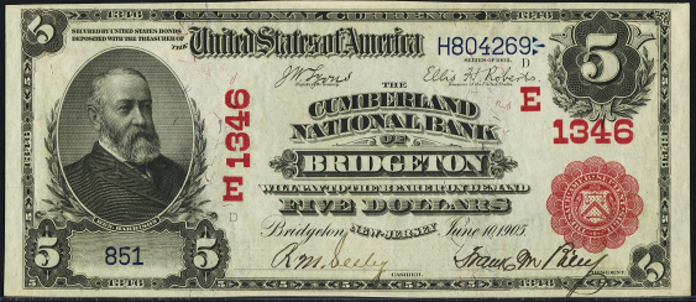Five Dollar Notes › Nationals › 1902 Five Dollar National Bank Notes › New York Charters › 1902 $5 Long Island City New York Commercial National Bank
Get Value Now
| Item | Info |
|---|---|
| Series | 1902 |
| Charter | #10329 Commercial National Bank of Long Island City, New York |
| Year Chartered | 1913, 167 Banks Chartered |
| City Info | Long Island City is the westernmost residential and commercial neighborhood of the New York City borough of Queens. L.I.C. is noted for its rapid and ongoing residential growth and gentrification, its waterfront parks, and its thriving arts community. L.I.C. has among the highest concentration of art galleries, art institutions, and studio space of any neighborhood in New York City. It is bordered by Astoria to the north; the East River to the west; Hazen Street, 49th Street, and New Calvary Cemetery in Sunnyside to the east; and Newtown Creek—which separates Queens from Greenpoint, Brooklyn—to the south. It originally was the seat of government of the Town of Newtown, and remains the largest neighborhood in Queens. The area is part of Queens Community Board 1, located north of the Queensboro Bridge and Queens Plaza; it is also of Queens Community Board 2 to the south. Source: Wikipedia |
| Similar Cities | City name is unique, no others like it. |
| Seal Varieties | Red, Blue |
| See Also | If your note doesn't match try: 1. 1907 $5 Legal Tender 2. 1899 $5 Silver Certificates |
| Other Info | 1. Value depends on notes known for charter, condition and market demand. |
| Neat Fact | Portrait of President Benjamin Harrison. |
No Obligations Offers and Appraisals
Please submit a good photo or scan. It will be identified and evaluated. Understand there may be subtle differences between the image you see above and your note. Signatures, design, markings and note condition will determine the offer price. Notes in Uncirculated or better condition receive the best offers.
Appraisals can be estimated for wholesale and retail prices. Wholesale is what dealers typically pay. Retail is what a collector might pay. Retail is slightly higher in most cases.
Please visit this page for USA Paper Money Reference. Do not treat this page as a reference guide, it is for appraisal and acquisition purposes only.
